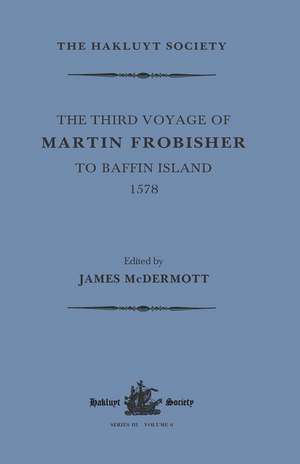The Third Voyage of Martin Frobisher to Baffin Island, 1578: Hakluyt Society, Third Series
Editat de James McDermotten Limba Engleză Paperback – 29 apr 2022
Din seria Hakluyt Society, Third Series
- 9%
 Preț: 869.49 lei
Preț: 869.49 lei -
 Preț: 311.47 lei
Preț: 311.47 lei -
 Preț: 312.51 lei
Preț: 312.51 lei -
 Preț: 297.53 lei
Preț: 297.53 lei - 9%
 Preț: 937.13 lei
Preț: 937.13 lei -
 Preț: 311.41 lei
Preț: 311.41 lei - 9%
 Preț: 942.92 lei
Preț: 942.92 lei -
 Preț: 324.57 lei
Preț: 324.57 lei -
 Preț: 311.80 lei
Preț: 311.80 lei -
 Preț: 312.86 lei
Preț: 312.86 lei -
 Preț: 324.37 lei
Preț: 324.37 lei -
 Preț: 313.67 lei
Preț: 313.67 lei -
 Preț: 314.06 lei
Preț: 314.06 lei -
 Preț: 299.73 lei
Preț: 299.73 lei -
 Preț: 312.09 lei
Preț: 312.09 lei -
 Preț: 317.78 lei
Preț: 317.78 lei -
 Preț: 316.29 lei
Preț: 316.29 lei -
 Preț: 315.29 lei
Preț: 315.29 lei -
 Preț: 316.87 lei
Preț: 316.87 lei -
 Preț: 309.70 lei
Preț: 309.70 lei -
 Preț: 312.61 lei
Preț: 312.61 lei
Preț: 312.09 lei
Nou
Puncte Express: 468
Preț estimativ în valută:
59.72€ • 62.56$ • 49.49£
59.72€ • 62.56$ • 49.49£
Carte disponibilă
Livrare economică 19 martie-02 aprilie
Livrare express 04-08 martie pentru 35.12 lei
Preluare comenzi: 021 569.72.76
Specificații
ISBN-13: 9781032319315
ISBN-10: 1032319313
Pagini: 280
Dimensiuni: 174 x 246 x 21 mm
Greutate: 0.52 kg
Ediția:1
Editura: Taylor & Francis
Colecția Routledge
Seria Hakluyt Society, Third Series
Locul publicării:Oxford, United Kingdom
ISBN-10: 1032319313
Pagini: 280
Dimensiuni: 174 x 246 x 21 mm
Greutate: 0.52 kg
Ediția:1
Editura: Taylor & Francis
Colecția Routledge
Seria Hakluyt Society, Third Series
Locul publicării:Oxford, United Kingdom
Public țintă
PostgraduateNotă biografică
James McDermott is an independent scholar whose (1984) M.Phil thesis provided an analysis of the economic structure and organisation of the Frobisher voyages utilising the voluminous account books of Michael Lok. He is a former special adviser to the Archival Research Task Force (ARTAF), the UK arm of the Canadian Museum of Civilisation's Meta Incognita Project, and a contributor to Meta Incognita: A Discourse of Discovery; Martin Frobisher's Arctic Expeditions 1576-1578, et. T.H.B. Symons (2 vols, Hull, Canada 1999). He is the author of Martin Frobisher, Elizabethan Privateer (Yale University Press, 2001)
Cuprins
The Third Voyage of Martin Frobisher to Baffin Island, 1578
Descriere
Martin Frobisher's third (1578) voyage to Baffin island was the consequence of flawed logic and excessive optimism on the part of the adventurers of the ephemeral 'Company of Cathay'. Their original intention - to find a north-western route to the Far East - had been largely forgotten following the imagined discovery of gold - and silver-bearing ore in Meta Incognita (the Unknown Limits), as Elizabeth I had named the forbidding and icy landscape which Frobisher and seventeen mariners had first sighted two years earlier. This was to be the English nation's first experience of a 'gold-rush', and if many refused to be swayed by the promise of an empire to rival that of Spain, others, including the Queen herself and many of her Privy Councillors, allowed their cupidity to override all caution. Supplemented by extremely detailed and opprobrious (though substantially accurate) accusations regarding Frobisher's role in this enterprise by his ex-partner, the merchant Michael Lok, these records provide a graphic, poignant and often humorous picture of a voyage which foreshadowed the glorious failures of a later age of English empire-building.
